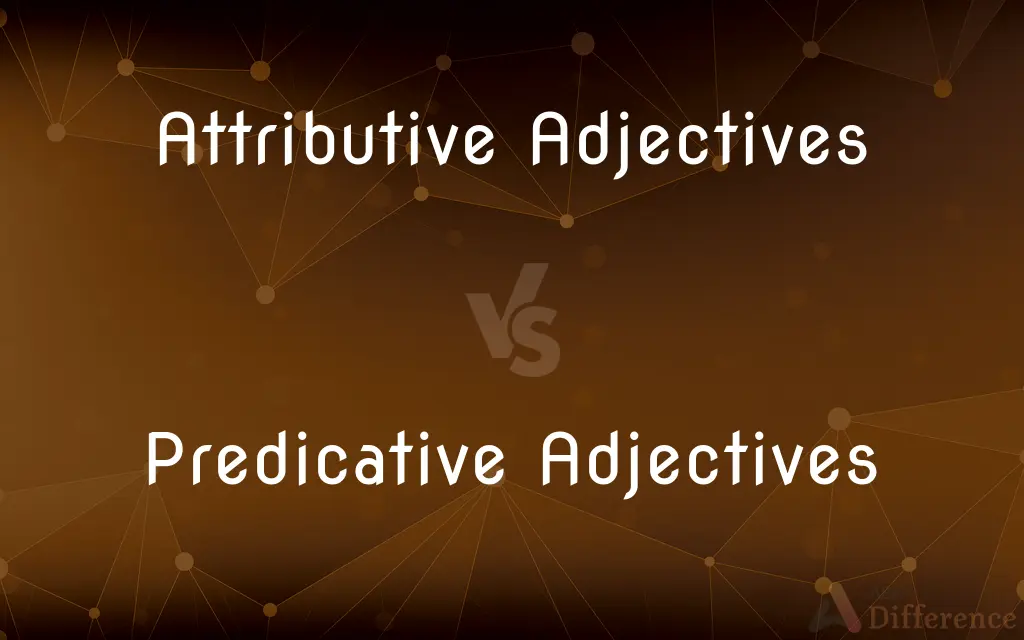Attributive Adjectives vs. Predicative Adjectives — What's the Difference?
By Tayyaba Rehman — Published on December 23, 2023
Attributive Adjectives modify nouns directly and appear before them. Predicative Adjectives appear after linking verbs and describe the subject.

Difference Between Attributive Adjectives and Predicative Adjectives
Table of Contents
ADVERTISEMENT
Key Differences
Attributive Adjectives are those adjectives that sit directly before the noun they modify. They help give a preliminary idea about the attributes of the noun in question. Predicative Adjectives, on the other hand, are placed after a linking verb and provide more information about the noun, which is the subject of the clause.
Attributive Adjectives serve to immediately characterize the noun. They're an integral part of the noun phrase. Predicative Adjectives are not part of the noun phrase. Instead, they're part of the verb phrase, offering a deeper insight into the characteristics or state of the subject noun.
For example, in the phrase "red apple," "red" is an Attributive Adjective. It provides direct information about the apple. In contrast, in the sentence "The apple is red," "red" is a Predicative Adjective as it describes the apple's color after a linking verb.
It's essential to note that some adjectives can function both attributively and predicatively. For instance, "happy" in "happy child" is attributive, while in "The child is happy," it's predicative. However, some adjectives are exclusively attributive or predicative.
In terms of sentence structure, Attributive Adjectives typically don't need a verb to link them to the noun they modify. Predicative Adjectives require a linking verb, like "is," "seem," or "become," to connect them to the subject.
ADVERTISEMENT
Comparison Chart
Position in Sentence
Directly before the noun.
After linking verbs such as "is," "seem," "become."
Function
Modify nouns directly.
Describe the subject after a linking verb.
Example
Red apple.
The apple is red.
Part of Sentence
Part of the noun phrase.
Part of the verb phrase.
Need for Linking Verb
No linking verb required.
Requires a linking verb.
Compare with Definitions
Attributive Adjectives
Modifiers that directly describe a noun.
A quiet room is my favorite.
Predicative Adjectives
Modifiers that provide insight about the subject after a verb.
The cat seems sleepy.
Attributive Adjectives
Adjectives that precede and modify a noun.
The tall man waved at me.
Predicative Adjectives
Adjectives that follow a linking verb to describe the subject.
The song was beautiful.
Attributive Adjectives
Words that give immediate characteristics of nouns.
The heavy bag was hard to lift.
Predicative Adjectives
Adjectives that aren't part of the noun phrase.
The tea is hot.
Attributive Adjectives
Adjectives that integrate with the noun they describe.
The golden ring is lost.
Predicative Adjectives
Terms that offer a deeper understanding of the noun after a verb.
The movie was interesting.
Attributive Adjectives
Directly qualifying terms for nouns.
She bought a new dress.
Predicative Adjectives
Descriptive words used with linking verbs to characterize the subject.
She is excited.
Common Curiosities
What are Attributive Adjectives?
Attributive Adjectives are adjectives that modify nouns directly and appear before them.
Give an example of an Attributive Adjective.
In "green tree," "green" is an Attributive Adjective.
Can an adjective be both attributive and predicative?
Yes, some adjectives can function both ways, like "happy" in "happy child" (attributive) and "The child is happy" (predicative).
How are Predicative Adjectives different from Attributive Adjectives?
Predicative Adjectives appear after linking verbs and provide descriptions about the subject, while Attributive Adjectives precede and directly modify the noun.
Provide a Predicative Adjective example.
In "The sky is blue," "blue" is a Predicative Adjective.
Are there adjectives exclusive to either attributive or predicative use?
Yes, some adjectives can only be used attributively or predicatively, but many can be used both ways.
In the phrase "an old friend," which type of adjective is "old"?
"Old" is an Attributive Adjective.
What links a Predicative Adjective to its subject?
A linking verb, like "is," "becomes," or "seems," connects a Predicative Adjective to its subject.
Do Attributive Adjectives require a linking verb?
No, they modify the noun directly without the need for a linking verb.
When are Predicative Adjectives used in a sentence?
They are used after linking verbs such as "is," "become," or "seem" to describe the subject.
In "The milk is cold," what type of adjective is "cold"?
"Cold" is a Predicative Adjective.
Can a sentence have both Attributive and Predicative Adjectives?
Yes, for example: "The red apple is delicious." Here, "red" is attributive and "delicious" is predicative.
Why are they called "Attributive" Adjectives?
They're called "Attributive" because they attribute or assign a characteristic directly to a noun.
Which is more common, Attributive or Predicative Adjectives?
Both are common and are used based on the desired sentence structure and meaning.
Is there a change in meaning if an adjective is used attributively vs. predicatively?
Most adjectives retain their basic meaning, but sentence emphasis and structure can shift.
Share Your Discovery

Previous Comparison
Equity Shares vs. Preference Shares
Next Comparison
Consumer Market vs. Organizational MarketAuthor Spotlight
Written by
Tayyaba RehmanTayyaba Rehman is a distinguished writer, currently serving as a primary contributor to askdifference.com. As a researcher in semantics and etymology, Tayyaba's passion for the complexity of languages and their distinctions has found a perfect home on the platform. Tayyaba delves into the intricacies of language, distinguishing between commonly confused words and phrases, thereby providing clarity for readers worldwide.
















































